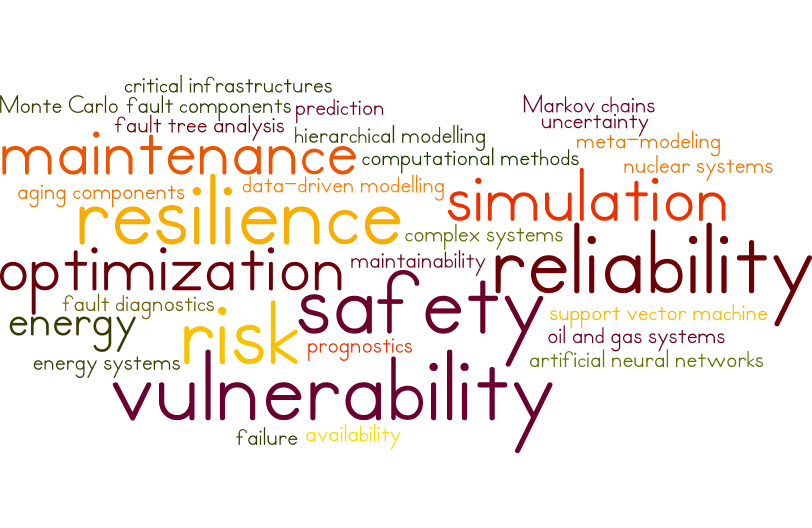SAFETY AND RISKS RESEARCH GROUP

| MEMBERS | PUBLICATIONS | DEFENSES HISTORY |
Our team is developing research activities for safety and risk analysis of complex engineered systems. Our models are mainly based on stochastic processes and data driven approaches with a strong focus on optimization and uncertainties quantification for decision making in design and operation. We are strongly connected to several industry partners with the chair Risk and Resilience of Complex System (LINK). This chair is supported by EDF, SNCF, Orange and Paris Airport. This is an arena to define study cases, share knowledge data and experiences, develop methods, implement benchmark and prototypes of tools. This chair is taking over the previous chair on Systems sciences and Energy Challenges supported by EDF.
Our research is organized around 3 main studied objects:
|
Research Group Head Anne BARROS
anne.barros @centralesupelec.fr +33(0)1.75.31.69.14 Building Bouygues - Office SA279 |
1. Complex systems and infrastructures, cyber physical systems
The analysis of these systems cannot be carried out only with classical methods of system decomposition and logic analysis. A framework is needed to integrate a number of methods capable of viewing the problem from different perspectives (topological and functional, static and dynamic, discrete and continuous...), properly treating uncertainties by probabilistic and non-probabilistic methods. Our main contribution is to use stochastic processes, data driven approaches and Monte Carlo simulation to identify influent parameters and critical items, and to define proper level of abstractions for modelling. The modelling work is achieved in the perspective of providing decision indicators for Safety, Risk, Availability and Maintenance management with a careful quantification of uncertainties.
KEY FIGURES
- 10 Members
- 2 Research chairs
- 2 PhDs Completed in 2020
- 18 Journals in 2020
- 8 Conference papers in 2020
2.Industry 4.0 and predictive maintenance
In the framework of Industry 4.0, our main contribution is to develop advanced models and optimization methods for dynamic risk management and predictive maintenance. This encompasses the assessment and modelling of components degradation with system usage, and the analyze and optimization of maintenance solutions. This can be done by multi-state physics, Bayesian and Markov chains models, Monte Carlo simulation. A particular focus is on failure prediction and prognostics of critical components, by data-driven approaches, e.g. adaptive artificial neural networks, support vector machines and the like. Regarding optimization, different methods are implemented in relation with optimization under uncertainties and robust optimization.

3. Resilience
We intend to assess and optimize the resilience of complex systems and critical infrastructures by modeling and optimizing the processes of barrier management, mitigation, crisis management, recovery. One of the objectives is to guaranty business continuity by investigating in which degraded states the system should be put back in a minimal amount of time. The approaches developed are related to agent-based modelling and resilient communities.
Our teaching activity is organized around 4 master level courses
• Risk assessment and resilience of systems and infrastructures
The goal of this course is to provide students with the foundational knowledge, the methodological competence and expertise, the modelling skills and computational tools necessary to address with an integrated, systemic approach the ever increasing and newly emerging issues in the areas of Reliability, Availability, Maintainability (RAM) of Industrial Equipment, Prognostics and Health Management (PHM) of Industrial Equipment, Safety, Risk, System Resilience.
• Practical risk and reliability analysis
This course includes basic concepts, risk matrix, risk management framework, stochastic failure models, calculation of reliability and availability, Fault tree and event tree, component importance measures, probabilistic risk assessment, life testing and parameter estimation, Bayesian inference, etc.
• Engineering maintenance
This course includes modelling and optimization for corrective, scheduled, condition-based maintenance, prognostics and health management and resilience optimization • Mathematical models for decision making The topics of this course cover basics of operation research, including linear programming, non-linear programming, numerical optimization, decision making methods and game theory.
• Data analysis for risk and reliability
In this course, we provide a thorough introduction of commonly used methods for data analysis and discuss their application in risk and reliability analysis. The students are supposed to learn fundamental theoretical results as well as some computer tools to help them apply the theoretical methods in practical. Topics of this courses are parameter estimation, Bayesian inferring, prognostics, artificial neural network, etc.
• Mathematical models for decision making

